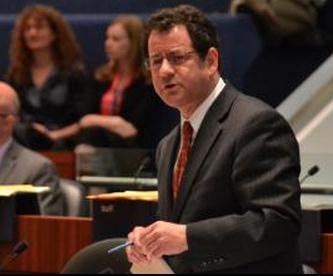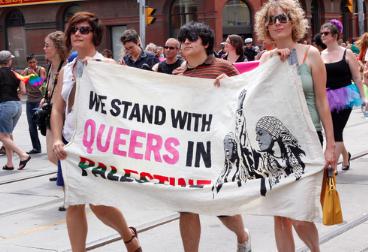
Councillor James Pasternak during QuAIA debates at city hall in 2012. Credit: Xtra file photo
Pride Toronto (PT) is bracing for another censorship fight with the City of Toronto, which is currently deciding whether to ban the phrase “Israeli apartheid” from all city-funded events.
Councillor James Pasternak says he remains determined to ensure the group Queers Against Israeli Apartheid (QuAIA) does not march in the Pride parade. And if they do march, he wants the city to deny PT its $123,807 cultural grant. Ultimately, Pasternak says, he would like to see the term “Israeli apartheid” banned from any event that receives city funding.
“The bottom line is that identifiable groups based on religion, creed, origin — they’re the ones who have to be relied on to alert elected officials when something is offensive,” Pasternak says. “So, when those groups say something is offensive, people have to accept that.”
Last year, after council voted to condemn the phrase “Israeli apartheid,” Pasternak put forward a motion to request that the city manager revisit Toronto’s anti-discrimination policy. That report was supposed to be released March 20, but it has been postponed and will now head to executive committee in April.
There are two reports coming before the executive, says QuAIA member Tim McCaskell. One will examine the corporate side of the issue, while the other looks at the question of whether PT should receive funding if it does not ban the use of the words “Israeli apartheid.”
“This is the equivalent of the city telling artists what they can and cannot say,” McCaskell says. “If they do it to Pride, they can do it to anybody. TIFF [the Toronto International Film Festival] could lose funding if they screen a film with the words ‘Israeli apartheid.’ This is absurd.”
Once again, McCaskell worries, Pride won’t know if it’s getting city money until a few weeks before the festival.
Pasternak suggested delaying the release of the report until April because, he says, its authors had not finalized their consultations with councillors. “The city has bigger and better things to focus its energies on than this nasty squabble,” he says.
In 2010, council passed a motion requiring all groups participating in Toronto festivals to comply with the city’s anti-discrimination policy. In 2011, city manager Joe Pennachetti released a report that stated QuAIA’s participation in the Pride parade did not violate the city’s anti-discrimination policy.
But Pasternak says council essentially rejected that report when it symbolically condemned the term “Israeli apartheid” last year. “Council got the final word on what is discriminatory or not, and council has spoken,” he says. “So we sent the city manager back to tighten up the discrimination policy as it relates to the dispersement of cultural grants.”
QuAIA’s lawyer Charles Campbell, who was not available for comment before press time, drafted a letter outlining some of the legal problems associated with trying to enforce a ban on the phrase. McCaskell says it was circulated to city councillors last month. But Pasternak remains undaunted. When asked whether he is concerned that banning the phrase “Israeli apartheid” will open up the city to legal challenges, he says, “Bring it on.”
Meanwhile, in October 2012, the leaders of Toronto’s major cultural organizations told PT that they planned to stand in solidarity against censorship should the city try to enforce a ban, which could have implications on funding for all major arts and cultural events in the city.
Kevin Beaulieu, PT’s executive director, says Pride has gone to great lengths to ensure that everyone concerned with this issue has had an opportunity to be heard. That includes implementing an arm’s-length legal panel, the dispute resolution process (DRP). So far, QuAIA has been the only group to receive a complaint. In June, the DRP concluded that QuAIA could march in the parade. “That decision is binding,” Beaulieu says. “QuAIA was not barred and participated last year.”
Beaulieu says members of the city’s cultural community are anxiously awaiting the release of the city’s report before taking further action.
Deputy city manager Brenda Patterson, who says she hasn’t seen the new report, notes that it will include professional advice from city staff, much like the previous report. “Council can send anything back,” she says. “At the end of the day, council wasn’t prepared to accept those directives and sent it back to look at a few other things.”
Patterson says she hasn’t seen the letter from QuAIA’s lawyers or heard about the support from the city’s other major cultural organizations. “But I’m not surprised that people are weighing in on all of this, and I suspect there will be many others that write or make deputations on this issue,” she says.
McCaskell is calling on Torontonians to stand up against censorship and support Pride at council in May or make a deputation to executive committee next month. “Everyone should start bugging their councillors because this persecution of Pride needs to stop,” he says.
“This has become a stick with which they can keep beating Pride. That should be a real concern to everyone in the community. If the content of Pride is to be determined by Rob Ford and his executive, we’re all in a lot of trouble.”
Pride brings in millions of dollars for the city, so it has every right to city funding, and it shouldn’t have to fight a censorship battle every year to get it, McCaskell says. “The city is treating Pride abominably. At some point you have to look at that and see the homophobia that’s going on here. This is way beyond Israeli apartheid at this point.”
Find out more about making a deputation at city hall or contacting your councillor here.
Legal opinion on QUAIA for Toronto City Hall – 2013 by Andrea Houston
Legal Opinion on QUAIA for Toronto City Hall 2013 Redacted

 Why you can trust Xtra
Why you can trust Xtra


